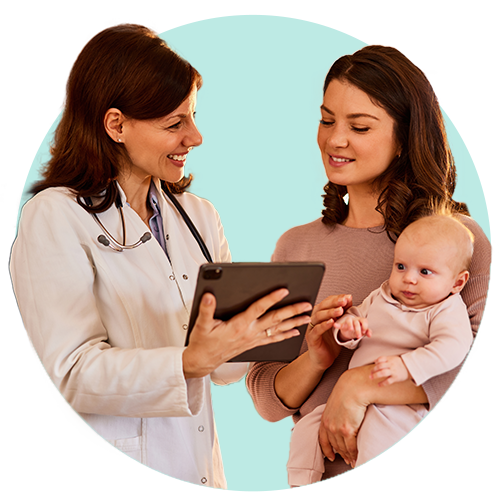
Digital point-of-care messaging can help normalize conversations about postpartum mental health and guide parents toward the help they need.
Call 1-833-TLC-MAMA (1-833-852-6262) for 24/7 free confidential support for pregnant and new moms. If you are experiencing thoughts of suicide, call or text the Suicide & Crisis Lifeline at 988 or text TALK to 741741.
Postpartum depression (PPD) and anxiety are faced by thousands of mothers each year, but sometimes they feel unable to discuss it openly due to uncertainty, stigma and shame. However, conversations around these struggles are beginning to break through to broader audiences. For example, in fall 2024, a TikTok video of a mother candidly sharing her postpartum experience gained widespread attention, inspiring thousands of other mothers to share their own stories. These videos shed light on symptoms such as feeling disconnected from one’s newborn, experiencing thoughts of self-harm, irregular sleep patterns and social withdrawal, which helps to normalize these mental health challenges and highlight how they can affect people in different ways.
These conversations on social media can be incredibly validating, and providing mothers with education and support in parallel at the point of care—such as private, personalized messages about postpartum mental health delivered right before doctor appointments—can make an even greater difference. Many women may not recognize their symptoms as postpartum depression or feel unsure about how to seek help, and education delivered when they are in a healthcare state of mind can help bridge that gap.
Understanding postpartum depression and anxiety
For the first few days after childbirth, it can be normal to feel a range of emotions. In addition to happiness and love, hormonal changes and sleep deprivation can cause stress and anxiety. Sometimes referred to as the “baby blues,” these feelings may lead to crying for no apparent reason, having trouble eating or sleeping, or doubting one’s ability to care for their baby.
The baby blues affect between 50% and 85% of new mothers and typically improve within one or two weeks without treatment. Postpartum depression, however, is more than the baby blues—it is a type of depression that “causes intense feelings of sadness, anxiety or despair that keep people from being able to do their daily tasks,” according to the American College of Obstetricians and Gynecologists. Postpartum depression typically starts about one to three weeks after childbirth, and research from the CDC shows about 1 in 8 women who recently gave birth reported symptoms of postpartum depression.
Similarly, postpartum anxiety is a mental health condition that causes excessive and/or debilitating worry. Many new parents with postpartum anxiety have trouble sleeping, feel terrified to leave their baby alone for a few minutes with an adult they trust, or feel afraid to leave their house with their newborn.
Postpartum mental health can be complex. Studies show that up to 50% of postpartum depression cases go undiagnosed—likely because women do not recognize the severity of their symptoms and/or because of the stigma around postpartum mental health. Believing that symptoms of depression and anxiety are just the ‘baby blues’ and a normal part of motherhood—along with the stigma around postpartum depression—can make moms feel like they are failures if they have symptoms. Additionally, cultural and societal expectations of postpartum bliss and perfection can prevent honest discussions about the challenges of new motherhood and can lead many mothers to downplay their symptoms to others, leaving them feeling isolated and preventing them from seeking help.
“One of the biggest barriers to diagnosing postpartum depression and anxiety is the stigma,” says Dr. Christina Suh, a pediatrician and Director of Clinical Content at Phreesia. “The pressure to ‘have it all together’ leaves little room for the complex emotions that come with this really big life change. This stigma can make it difficult for moms to admit they are struggling even to themselves, let alone to others.”
The important role of education in maternal mental health
This stigma and lack of recognition about postpartum depression and anxiety underscores the critical need for proactive education around postpartum mental health. Direct, personalized, digital point-of-care messaging can play a pivotal role in initiating these conversations early—ideally beginning during pregnancy—by providing timely and accessible information to women about what postpartum depression looks like, what their options are, when to seek help and how it is diagnosed.
Education helps mothers recognize the warning signs, understand what symptoms are normal and what might indicate a need for more support, feel supported during a major life transition and know that help is available to them. Delivering this education through digital point-of-care messaging helps ensure that the door to these conversations is opened early and kept open, empowering mothers to seek the support they need during this stage of life.
“The point of care is an incredibly effective place to reach mothers and parents with this education because it meets them where they already are,” Dr. Suh says. “Education delivered at the point of care reaches patients when they’re already thinking about their health or their baby’s health and well-being.”
Digital resources delivered privately to patients at the point of care—such as education about symptoms and what is and isn’t normal, doctor-patient discussion guides and other mental health resources—can empower expecting and new parents to recognize the warning signs of postpartum depression and anxiety early. These resources can also facilitate open and honest conversations between healthcare providers and parents, reducing the stigma around postpartum mental health and promoting supportive dialogue.
Ultimately, digital point-of-care messaging—delivered directly to patients when they are in a healthcare state of mind—can help normalize conversations about postpartum mental health and help guide parents toward the support and care they need, while ensuring they feel heard and supported during the postpartum period.
Learn how Phreesia can help deliver messages about mental health and maternal mental health at the point of care.


